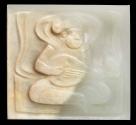Advanced Search
This silver buckle and set of seven, partially calcified, plaques carved in low relief, show musicians seated on mats playing the yaogu waist drum, xiao flute, pipa lute, paiban clappers, gu drum, bo cymbals, and sheng reed-organ. Perforations on the reverse and remains of metal rivets are evidence that these were likely attached to a leather belt. The musicians decorating the plaques wear Central Asian clothing—hats, tunics, long trousers, and boots—and sit cross-legged on the ground. The stylized depiction of the musicians has distinct Chinese characteristics that resemble Buddhist carvings and frescos from the Tang Dynasty period (618–907 CE). These characteristics include rhythmic drapery, curving lines, and a sense of energetic movement. When worn, the belt projected an auspicious quality as the wearer was figuratively and literally surrounded by musicians and attendants. Such a luxurious ornament with jade plaques would have been reserved for use by the emperor, royal family members, or high officials.
Belt buckle and seven plaques
Chinese
Tang dynasty
8th century
Medium/Technique
Silver, jade
Dimensions
Jade: 5.2 x 6.2 cm ( 2 1/16 x 2 7/16 in ; Silver: 13.5 x 7.8 cm:( 5 5/16 3 1/16 in )
Credit Line
Marshall H. Gould Fund
Accession Number58.692g
ClassificationsJewelry / Adornment
This silver buckle and set of seven, partially calcified, plaques carved in low relief, show musicians seated on mats playing the yaogu waist drum, xiao flute, pipa lute, paiban clappers, gu drum, bo cymbals, and sheng reed-organ. Perforations on the reverse and remains of metal rivets are evidence that these were likely attached to a leather belt. The musicians decorating the plaques wear Central Asian clothing—hats, tunics, long trousers, and boots—and sit cross-legged on the ground. The stylized depiction of the musicians has distinct Chinese characteristics that resemble Buddhist carvings and frescos from the Tang Dynasty period (618–907 CE). These characteristics include rhythmic drapery, curving lines, and a sense of energetic movement. When worn, the belt projected an auspicious quality as the wearer was figuratively and literally surrounded by musicians and attendants. Such a luxurious ornament with jade plaques would have been reserved for use by the emperor, royal family members, or high officials.



